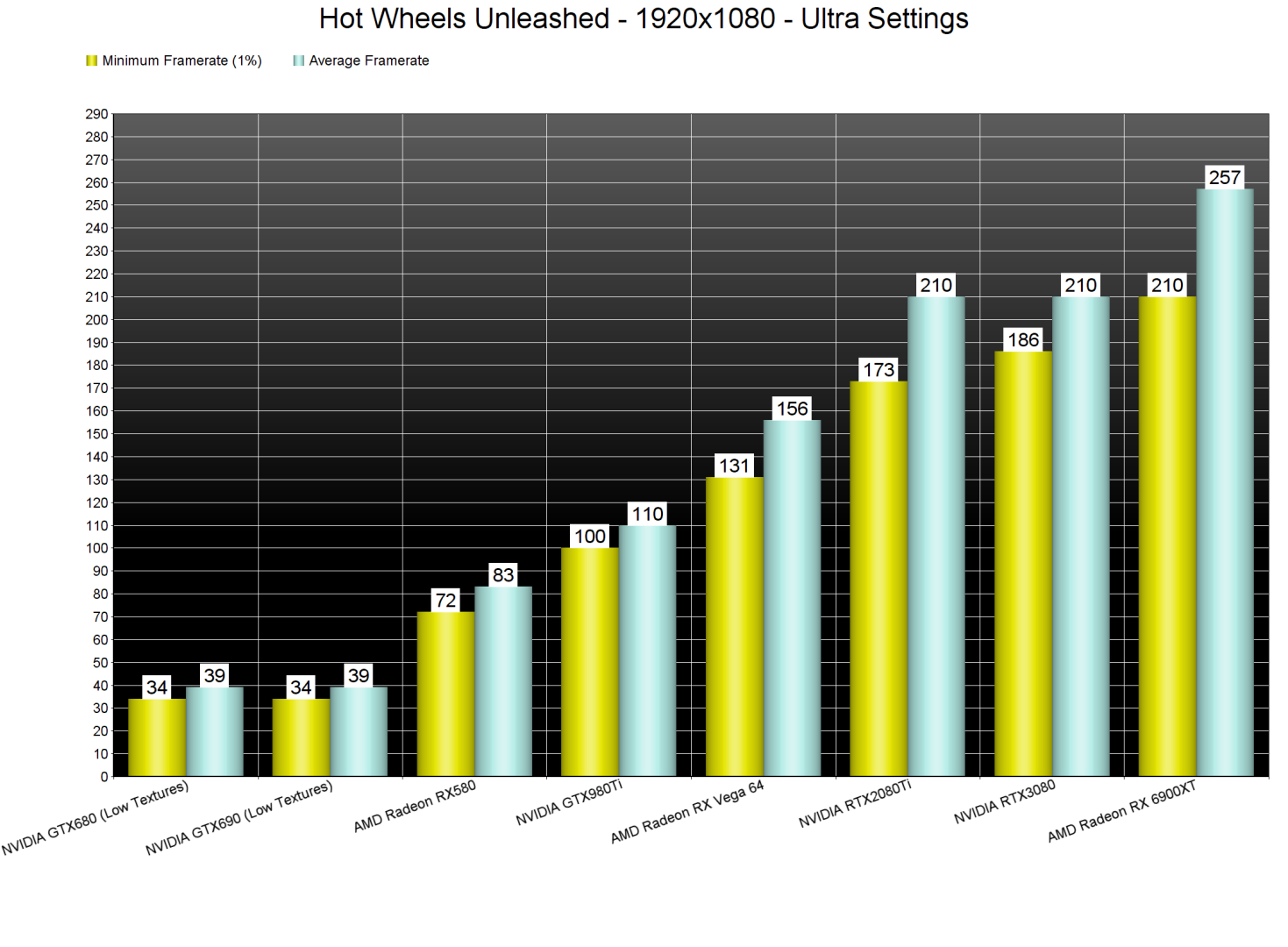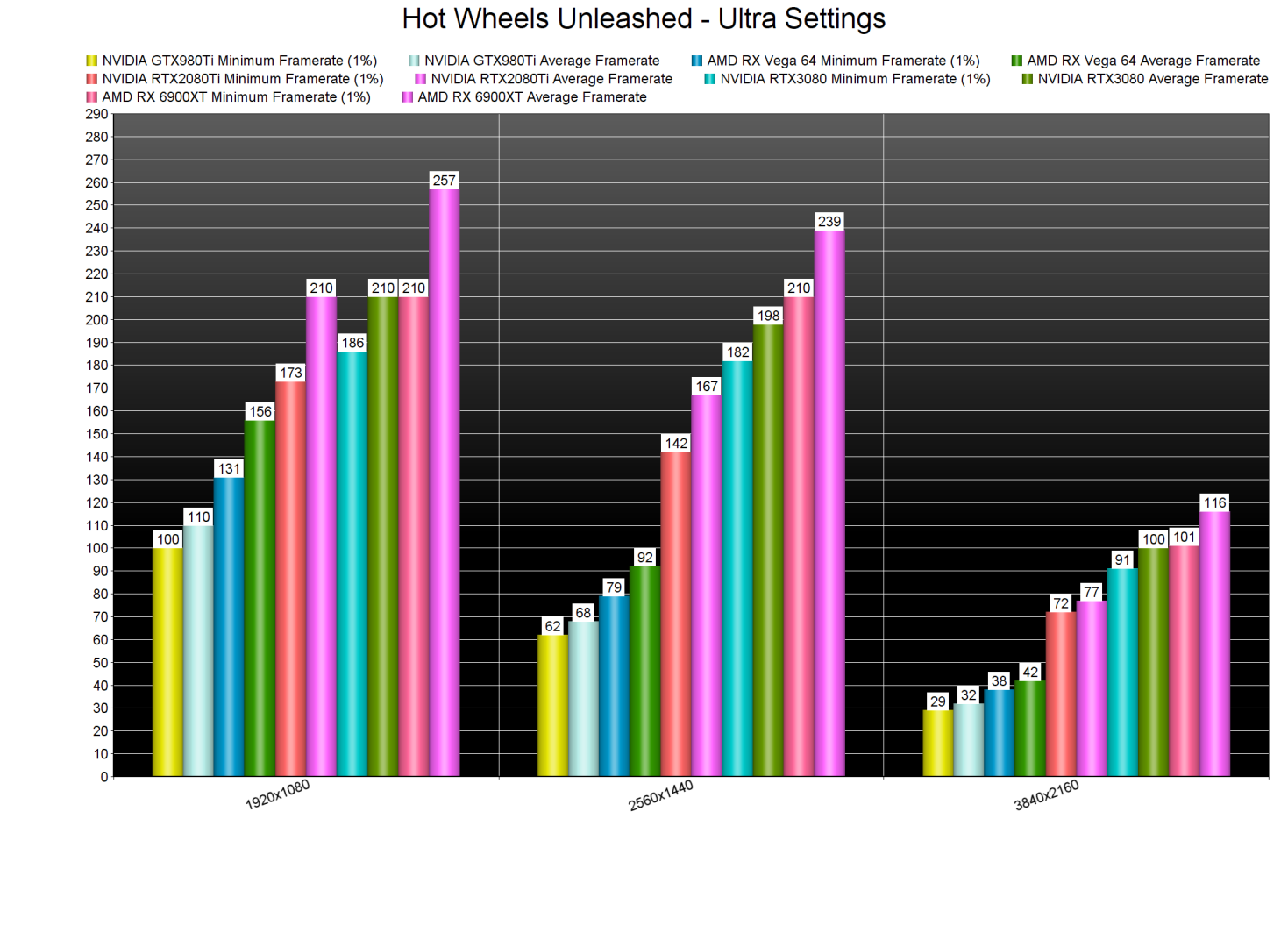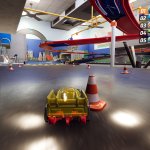Milestone has just released a new arcade racing game, Hot Wheels Unleashed, on PC. Powered by Unreal Engine 4, it’s time to benchmark it and see how it performs on the PC platform.
For this PC Performance Analysis, we used an Intel i9 9900K with 16GB of DDR4 at 3600Mhz, AMD’s Radeon RX580, RX Vega 64, RX 6900XT, NVIDIA’s GTX690, GTX980Ti, RTX 2080Ti and RTX 3080. We also used Windows 10 64-bit, the GeForce 472.12 and the Radeon Software Adrenalin 2020 Edition 21.9.2 drivers. NVIDIA has not included any SLI profile for this game, meaning that our GTX690 performed similarly to a GTX680.
Milestone has added a few graphics settings to tweak. PC gamers can adjust the quality of Anti-Aliasing, Textures, Anisotropic Filtering, Shadows, Reflections, Ambient Occlusion, Depth of Field, Bloom, Motion Blur, Lens Flares, and Particles. The game also features a resolution scale option, and supports uncapped framerates.
Hot Wheels Unleashed does not come with a built-in benchmark tool. As such, we’ve decided to benchmark the Second Round stage. This stage appeared to be one of the most demanding ones, so it will give you a better idea of how the game runs.
Hot Wheels Unleashed does not require a high-end CPU. At 1080p/Ultra we were GPU-limited by our RTX3080. We were also getting between 180-200fps. As such, there was no point at all simulating and benchmarking different CPU models. Suffice to say that any modern-day quad-core CPU will be able to run this game without issues.
The game also does not require a high-end GPU. At 1080p/Ultra settings, most of our GPUs were able to run the game with more than 60fps at all times. Hell, even our AMD Radeon RX580 was able to push more than 60fps.
At 1440p/Ultra, our top five GPUs had no trouble running the game smoothly. As for 4K/Ultra, our RTX2080Ti, RTX3080 and AMD Radeon RX6900XT had no trouble at all.
At this point, we should note how incredibly fast Hot Wheels Unleashed performs on AMD’s hardware. While this game uses Unreal Engine 4, it is significantly faster on AMD’s GPUs. For instance, the performance gap between the GTX980Ti and the Vega 64 is pretty big.
Graphics-wise, Hot Wheels Unleashed looks great. All of its cars resemble those plastic real-life Hot Wheels miniatures. The stages also look great, and there are some pretty cool lighting/reflection effects. The game does not have any dynamic lighting or weather system, meaning that most of its lighting/global illumination is pre-baked. And that’s a big plus in our opinion as it makes it look great and run amazingly fast on a wide range of GPUs. Moreover, there aren’t any car deformation/destruction effects, and its stages are a bit small for today’s standards. Again, though, this is a bit irrelevant when the game looks this good.
All in all, Hot Wheels Unleashed performs incredibly well on PC. The game does not require a high-end PC system and can run smoothly on a huge range of PC configurations. It also looks great, so kudos to Milestone for not messing things up. Yes, it does not sport any modern-day techniques like Ray Tracing or advanced dynamic lighting/weather systems. However, it uses traditional rasterization techniques in order to provide a great overall image. Not only that, but it displays proper keyboard key prompts (hear that KOEI Tecmo?). Still, Hot Wheels Unleashed is not a perfect product. The game does suffer from some stutters when a race begins. These stutters though are not as frequent or as annoying as those we’ve seen in other Unreal Engine 4 games. Other than that, the game is incredibly optimized on PC!

John is the founder and Editor in Chief at DSOGaming. He is a PC gaming fan and highly supports the modding and indie communities. Before creating DSOGaming, John worked on numerous gaming websites. While he is a die-hard PC gamer, his gaming roots can be found on consoles. John loved – and still does – the 16-bit consoles, and considers SNES to be one of the best consoles. Still, the PC platform won him over consoles. That was mainly due to 3DFX and its iconic dedicated 3D accelerator graphics card, Voodoo 2. John has also written a higher degree thesis on the “The Evolution of PC graphics cards.”
Contact: Email


















